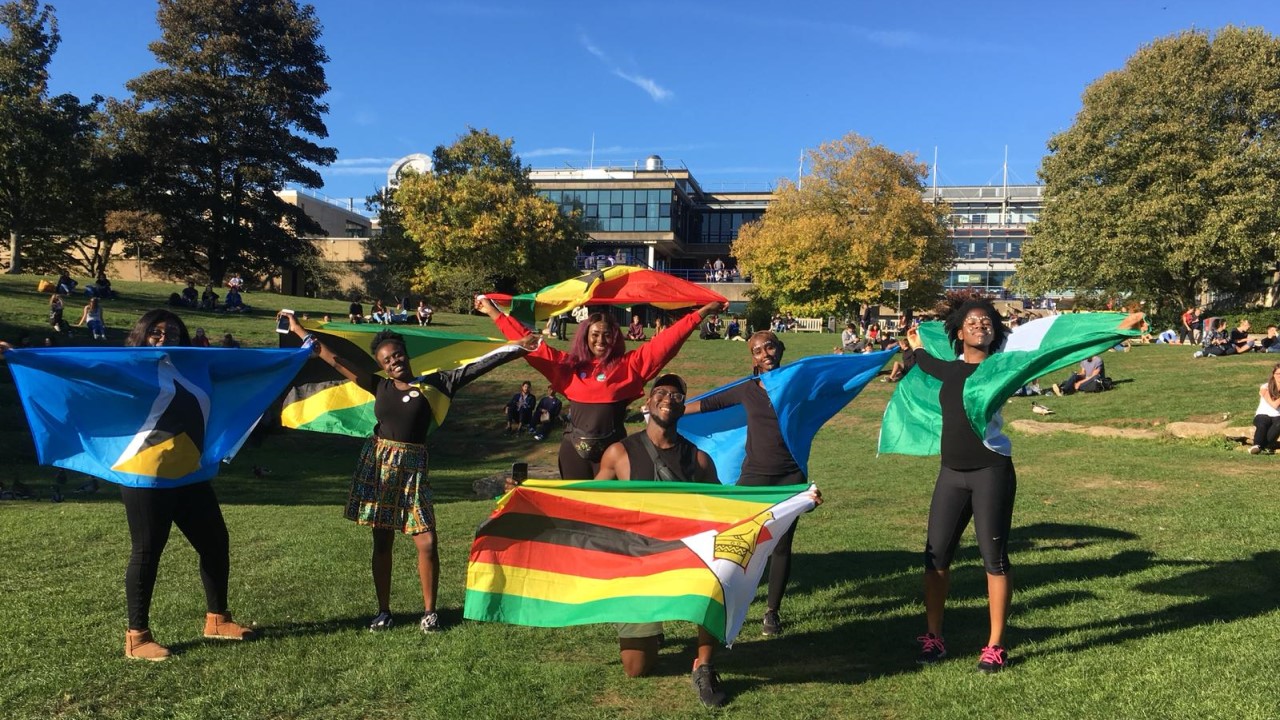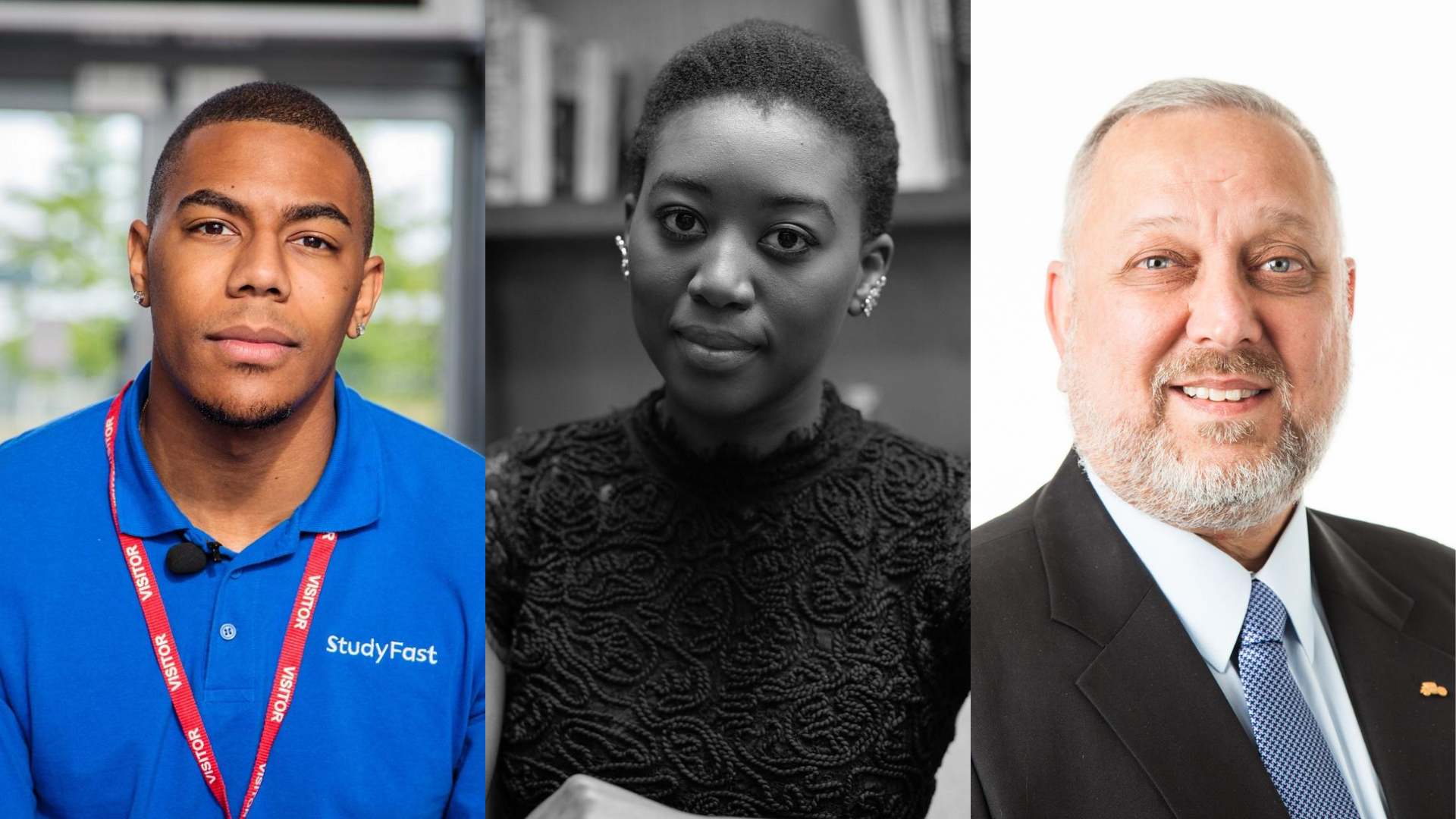Jordan Harry (BSc Sport & Exercise Science 2018) is an international public speaker, as well as the CEO and founder of StudyFast, a company that delivers speed-reading and memory training. He is half Nigerian and half Russian, was born in Essex and now lives in Norfolk.
Rakesh Sharma OBE (Executive MBA 1993) was born in Kenya to Indian parents and moved to the UK in 1966. He holds a number of senior industry roles and was elected as a Fellow of the Royal Academy of Engineering in 2016. In 2017 Rakesh was honoured with an OBE for services to defence capability and was named as a BAME 100 Business Leaders finalist in 2019.
Bokani Tshidzu (BSc Politics with Economics 2009) has previously worked in a range of corporate environments, including banking, but is now a painter and digital artist. She was recently featured on BBC1’s The Big Painting Challenge and is studying for a master’s in fine art at Goldsmiths College. She was born in Zimbabwe, moving to the UK at the age of 13, and now lives in London.
JH: How are brands responding to the Black Lives Matter movement?
RS: There are a number of brands who have taken it very seriously and have taken an inward look as to what they need to do in order to become more equal. You also get a set of brands who feel that they have to jump on the bandwagon because it’s the latest thing on social media, and suddenly start putting up pictures of black squares, but they don’t actually do anything internally – to look at their policies, look at the diversity and inclusion within their business, and look at how to make themselves more meritocratic. So it’s trying to distinguish which are serious and which are treating it as marketing.
BT: I would add that a lot of brands haven't felt like they know what's appropriate to do. When I worked in corporate, I’d often find that I was the only black person out of 100 on my floor. Similarly, there weren't enough structures for mentoring – there were black networks, but they weren't providing opportunities for senior people to mentor younger people coming into the industry.
JH: We don’t just want people to listen to us because, you know, there are 101 webinars where people are just talking. We want you to be able to go away and make your own conclusions, make your own actions – and part of that might be creating your own BAME network.
We also need to be aware of what could potentially happen now, which is this idea of tokenism – this idea that because a company’s not diverse and they hear that they need more diversity, they just address higher management levels. We need to be cautious of companies just hiring people based on ethnicity. I can attest to this, that I have probably succeeded faster in my field of work because I break the stereotype. A lot of people will see someone that looks like them and see what they can do to help them.
RS: No one in the BAME community shies away from hard work. What we’re looking for are three things. The first is aspiration: if you believe growing up that you can’t be a CEO or a doctor or a scientist, then you never try. The next thing is education: give the younger generation a decent education so that they can do something with their aspiration. And then finally, to make it all come together, you have to give opportunity. So even if someone in the BAME community has the aspiration and education but never get the opportunity, because they’re not connected and they’re not white, then it’s all for nothing.
JH: What impact do you think all of this is going to have on the UK employment landscape?
RS: It’s very difficult to say what I think we’ll see. But what I hope to see – equal opportunity for BAME candidates in life and in society – is not an overnight thing. The Black Lives Matter movement and George Floyd’s murder in the United States is not going to change things overnight. It’s going to put that topic on the agenda for discussion. This is what we’ve been seeing over the last 50 years. During my school years, in a comprehensive school, teachers used to make statements that today would see them fired immediately.
It may seem that we’ve made no progress at all in this country – we have, but there’s a lot more to come. I hope that when companies are looking at recruiting and promotion, they look beyond skin colour to the merit, capability and work ethic that people have. If you have that, you’ll have the natural increase of BAME people, and eventually start to see more BAME chief executives. At the moment, only 6% of the FTSE 350 have a BAME chief executive, when actually the BAME community make up 14% of this country. We hear a lot about gender equality, but we haven’t heard a lot about racial equality in companies.
BT: We've seen political and legal changes – what we're now looking for is the economic and the finances to match up with that. I wanted to touch on people who might be thinking, ‘How do I respond to the current climate? How do I put myself out there?’ Maybe you're just graduating, thinking about what's next and looking at how you engage with the job market.
Most opportunities aren’t ‘apply through the corporate form, then get an interview and get hired in a meritocratic way’. There’s a great Malcolm Gladwell quote where he talks about how the rules are not built for you to succeed. You have to be more creative about how you put yourself out there. Most of the time, I was offered jobs by people who were inspired by projects I was running, and then brought me into the company sideways. With the name on my CV, I wouldn’t even have got an interview.
JH: We all have unconscious biases. What’s important is that we acknowledge what they are. I’ve been brought into many companies by referral by other black people – again, an unconscious bias on both sides. I believe what we all need to do is educate ourselves and understand what biases we do or don’t have. Who you know will get your foot in the door, but what you know will keep you there. I really do believe that.
JH: Moving on from the workplace as it stands right now, what could universities be doing?
RS: I think universities could do more with aspiration. They should be going more into schools to stimulate that demand from the BAME community.
BT: For me, the needs when I was at university were quite practical. I didn't know there were bursaries for people from low-income families like myself and I didn't even know where to look for that advice.
RS: When you think about how we can make sustainable change for the non-white community, it’s a bit like the R number for Covid-19. If one person succeeds in life and helps two people to succeed, and those two people then help others, that’s how we’re going to get meritocracy and equality.
JH: As we keep echoing, this conversation has to keep going. The Black Lives Matter movement didn’t just start – it’s been going for long time. But it’s now at the forefront of media, we’re locked down and we have nothing else to do but look at our phones. It’s an opportunity to really educate yourself on what’s been happening and what’s going to happen.
Make a difference

Chair of the University’s African and Caribbean Society, Paul Joel, explains how you can help:
“There are a variety of ways you can help BAME students. Create specific networking opportunities targeting BAME students. Studies in the UK show that graduates from black African and other black ethnic groups are the most likely to have no destination five years after graduating, standing at 9.4% and 10% respectively. Networking is one of the key ways of entering the workplace and will help to bridge this gap. Career-building tools – such as job fairs, CV workshops and job postings geared towards BAME students – can also help them to apply for higher-paying and more competitive roles.”
If you’re interested in getting involved with ACS events such as panel discussions, please email advancement@bath.ac.uk
